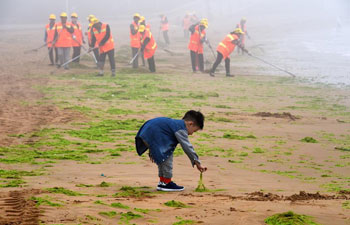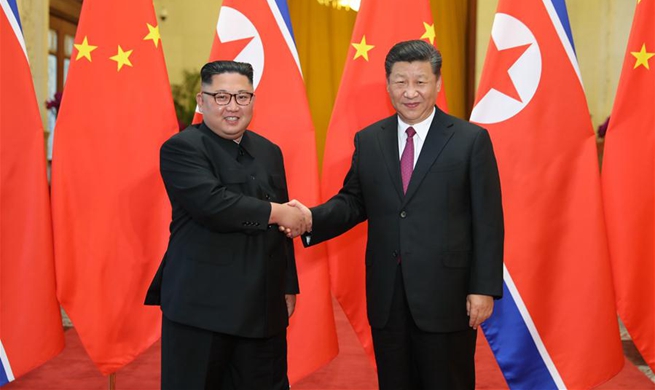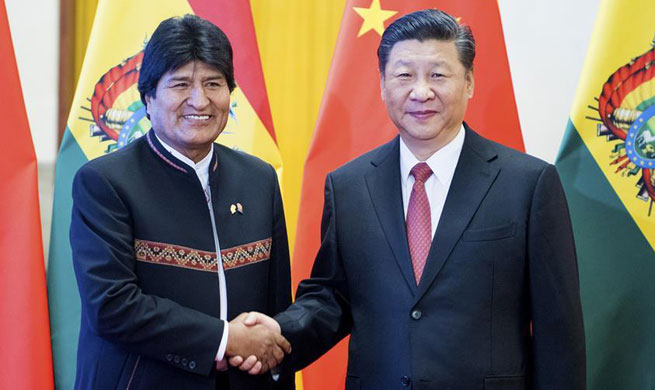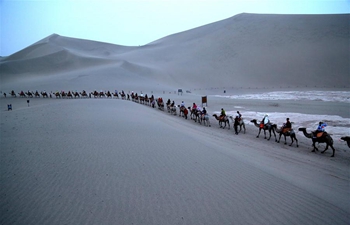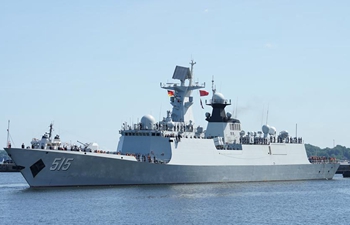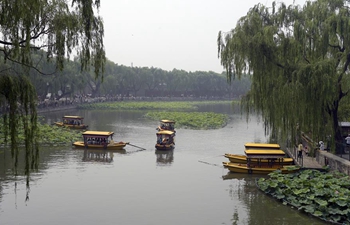by Xinhua Writers Zhang Ning, Xie Meihua, Fei Liena
HONG KONG, June 20 (Xinhua) -- In early 1980, when the Great Wall Sheraton Hotel Beijing was being built in Beijing, it triggered the curiosity of many people, both Chinese and foreigners.
At that time, not too many people realized the hotel, one of the first Sino-foreign joint projects after China began reform and opening-up, would remind them of the pre-reform days when decades later, they witnessed a much more prosperous China.
"Why are they building a high-class hotel in the countryside? It is a waste of money. No one will book a room." Zamir Ahmed Awan, then a Pakistani student, said that's what he thought four decades ago.
Beijing was a modern city inside its Second Ring Road, but outside that, it was still a sprawling village. During his life in China in the 1970s and 1980s, Awan witnessed Beijing residents using "grain and oil vouchers" to get their daily food rations.
Today, deputy dean of the Chinese Studies Center of Excellence at the Islamabad-based National University of Sciences and Technology, Awan is a witness to China's journey of reform and opening-up,like many others from neighboring countries.
EYES LONGING FOR BRIGHT FUTURE
The year 1978 was very significant for China, when the nation began a new era of reform and opening-up.
In the same year, the Japanese film Manhunt was released in China's theaters and became a hit.
Ryoko Nakano, who starred in it, was scared by her own popularity when she first visited China in 1979. She was cheered everywhere.
"I saw a sea of bicycles in Beijing's major street ... from my hotel windows," the Japanese diva said.
Although they wore almost the same clothes, the Chinese seemed full of vigor and eagerness to create a future, she said.
Asked about her first impression of China, the Japanese movie star recalled seeing posters in every lane and avenue. They read "Reform and Opening-up" and "Self-Reliance".
She said what impressed her most were the eyes of the people, longing for a bright future.
Nakano's China tour could be seen as one episode in Sino-Japanese cooperation, which was speeding up in the 1970s.
In the autumn of 1978, then Chinese leader Deng Xiaoping visited Japan, starting up the mutual cooperation.
China, 40 years later, has become the largest trade partner of Japan and Japan has become the second largest trade partner of China.
Between 2013 and 2016, bilateral trade reached 1.2 trillion U.S. dollars and average trade value surpassed 800 million dollars a day, almost equaling the yearly value of 1972 when the two neighbors resumed normalization of diplomatic ties.
"It is a common ideal for mankind to build a world without conflicts, one with equal development opportunities and every people in it blessed with happiness," former Japanese Prime Minister Yasuo Fukuda told Xinhua.
"China's proposal to build a community with a shared future for mankind displays visionary thinking. I wish countries would work hand-in-hand to achieve that goal," he said.
FROM BICYCLES TO HIGH-SPEED TRAINS
Fukuda visited China many times. Impressed by China's high-speed railways, Fukuda said in an earlier interview that the "gaotie" -- high-speed railway -- symbolized China's overall high-speed development.
"The Chinese cities are increasingly better arranged and managed year after year, and now there's no difference between the Chinese cities and those of developed countries," he said.
"I have participated in many Japan-China dialogues and multilateral dialogues in which China and Japan were included. At the dialogues, the Chinese side always brought with it new ideas and concepts, a confidence resulting from the greater overall national strength," he said.
From the "bring in" strategy to "go global", and from accession to the World Trade Organization to the Belt and Road Initiative, China has shouldered its responsibilities as a major country, helping cope with the Asian and global financial crises, and becoming a growth engine and stabilizer for the world economy.
Commenting on China's economic development, former Thai Deputy Prime Minister Pinit Jarusombat said: "The sustainable growth of the world economy comes (only) as China serves as the growth engine."
Recalling his first visit to China in 1976, he said he was invited to a banquet which served only three dishes, with just one of meat.
Today, Thailand welcomes millions of Chinese visitors every year, with annual two-way trade reaching 80 billion dollars. The Chinese language has become the most popular foreign language after English in Thailand.
JOINING HANDS FOR COMMON DEVELOPMENT
In the northern mountainous part of Laos, where the dry season ends in May, thousands of Chinese railway builders were working around the clock to build the China-Laos Railway, a major transport artery of the China-Laos Economic Corridor.
"This railway will modernize the primitive villages along its route, and villagers' lives will have earthshaking changes," said Chindasack Nhotmanhkhong, director of the Nationwide Trading Petroleum Public Company of Laos.
In the past 40 years, China's nation builders have toiled to realize the dream of becoming a strong and rich nation with massive social development.
Today, China's concept of establishing a new global governance system has injected new vitality into the common development of the world.
Since the 18th National Congress of the Communist Party of China, China has been implementing its diplomatic philosophy of good neighborliness featuring amity, sincerity, mutual benefits and inclusiveness.
China also advocates the Asian security concept, is expanding regional cooperation and promoting solutions to burning issues, gathering broad consensus and strength to build an Asian community with shared future.
"Commitment to economic reform and market principles underpinned China's economic success and social development," Peter Drysdale, head of Australian National University's East Asian Bureau of Economic Research, said.
"The idea of 'building a community of a shared future for mankind' is an important reference point in international relations. The approach to climate change, trade policy, and the BRI (Belt and Road Initiative) are all parts of a shared future that can be viable," he added.








